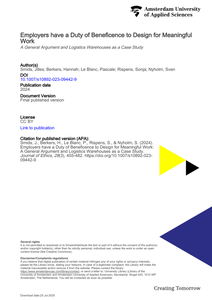Artificial intelligence-driven technology increasingly shapes work practices and, accordingly, employees’ opportunities for meaningful work (MW). In our paper, we identify five dimensions of MW: pursuing a purpose, social relationships, exercising skills and self-development, autonomy, self-esteem and recognition. Because MW is an important good, lacking opportunities for MW is a serious disadvantage. Therefore, we need to know to what extent employers have a duty to provide this good to their employees. We hold that employers have a duty of beneficence to design for opportunities for MW when implementing AI-technology in the workplace. We argue that this duty of beneficence is supported by the three major ethical theories, namely, Kantian ethics, consequentialism, and virtue ethics. We defend this duty against two objections, including the view that it is incompatible with the shareholder theory of the firm. We then employ the five dimensions of MW as our analytical lens to investigate how AI-based technological innovation in logistic warehouses has an impact, both positively and negatively, on MW, and illustrate that design for MW is feasible. We further support this practical feasibility with the help of insights from organizational psychology. We end by discussing how AI-based technology has an impact both on meaningful work (often seen as an aspirational goal) and decent work (generally seen as a matter of justice). Accordingly, ethical reflection on meaningful and decent work should become more integrated to do justice to how AI-technology inevitably shapes both simultaneously.
DOCUMENT

Through a qualitative examination, the moral evaluations of Dutch care professionals regarding healthcare robots for eldercare in terms of biomedical ethical principles and non-utility are researched. Results showed that care professionals primarily focused on maleficence (potential harm done by the robot), deriving from diminishing human contact. Worries about potential maleficence were more pronounced from intermediate compared to higher educated professionals. However, both groups deemed companion robots more beneficiary than devices that monitor and assist, which were deemed potentially harmful physically and psychologically. The perceived utility was not related to the professionals' moral stances, countering prevailing views. Increasing patient's autonomy by applying robot care was not part of the discussion and justice as a moral evaluation was rarely mentioned. Awareness of the care professionals' point of view is important for policymakers, educational institutes, and for developers of healthcare robots to tailor designs to the wants of older adults along with the needs of the much-undervalued eldercare professionals.
DOCUMENT

Objective: To construct the underlying value structure of shared decision making (SDM) models. Method: We included previously identified SDM models (n = 40) and 15 additional ones. Using a thematic analysis, we coded the data using Schwartz’s value theory to define values in SDM and to investigate value relations. Results: We identified and defined eight values and developed three themes based on their relations: shared control, a safe and supportive environment, and decisions tailored to patients. We constructed a value structure based on the value relations and themes: the interplay of healthcare professionals’ (HCPs) and patients’ skills [Achievement], support for a patient [Benevolence], and a good relationship between HCP and patient [Security] all facilitate patients’ autonomy [Self-Direction]. These values enable a more balanced relationship between HCP and patient and tailored decision making [Universalism]. Conclusion: SDM can be realized by an interplay of values. The values Benevolence and Security deserve more explicit attention, and may especially increase vulnerable patients’ Self-Direction. Practice implications: This value structure enables a comparison of values underlying SDM with those of specific populations, facilitating the incorporation of patients’ values into treatment decision making. It may also inform the development of SDM measures, interventions, education programs, and HCPs when practicing.
DOCUMENT
